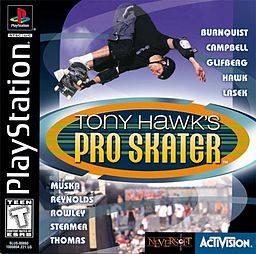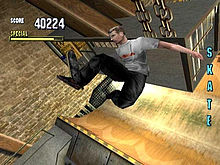- Tony Hawk's Pro Skater
-
Tony Hawk's Pro Skater Developer(s) Neversoft (Original PlayStation version)
Edge of Reality (N64 port)
Treyarch (Dreamcast port)
Natsume (Game Boy Color version)
Aspyr Media (Windows Mobile)
Ideaworks Game Studio (N-Gage port)Publisher(s) Activision
Crave Entertainment (Dreamcast)
Nokia (N-Gage)Platform(s) PlayStation, Nintendo 64, Game Boy Color, Dreamcast, N-Gage and Xbox 360 Release date(s) PlayStation
- NA August 31, 1999
Game Boy Color
- NA March, 2000
N-Gage- EU October 10, 2003
- NA October 13, 2003
Genre(s) Extreme sports Mode(s) Single-player, multiplayer Rating(s) ESRB: T (PlayStation/Dreamcast)
E (Nintendo 64/Game Boy Color)Tony Hawk's Pro Skater, released as Tony Hawk's Skateboarding in Europe, Australia and New Zealand, is a skateboarding video game developed by Neversoft. Published by Activision in 1999, it is the first entry in the Tony Hawk series of video games. Development began after Tony Hawk's debut stint at the 1998 X-Games, and was put to a closure a couple months before its release.
Pro Skater was originally released for the PlayStation on August 31, 1999, and was later ported to the Nintendo 64, Dreamcast, and N-Gage. It also received a Game Boy Color adaptation. All versions except for the GameBoy Color version met with critical acclaim from critics, who praised it for its innovative gameplay, level designs and control scheme. It was also commercially successful, selling rapidly upon its opening month. The game resulted in a successful franchise that continued to be active until 2010.
Contents
Gameplay
The goal of the game is to successfully perform and combine aerials, flips, and grinds, with successful executions adding to the player's score. The point value of the trick is based on time maintained, degrees rotated, number of tricks performed in sequence, and the amount of times the tricks have been used (the more often a trick is used, the less it's worth). Successful tricks also add to the player's special meter, which, once full, allows for the execution of "signature moves" which are worth a great deal more than normal tricks. Bails (falling off the skateboard due to poor landing) cause for no points to be awarded for the attempted trick and resets the special bar to empty.
In "Career Mode", the player has five tapes (i.e. objectives) to obtain in six of the nine levels. The player has only two minutes in which to obtain a tape after which their run ends. It is not necessary to get every given tape in a level in one run though, as individual objectives are marked off once completed. In each level, two of the tapes are acquired by reaching set scores (with the second score being two to three times the amount required for the first), one is obtained by collecting the five letters to spell "SKATE", and one is a hidden tape which the player must find by looking in secluded areas, and the last tape's requirement varies from level to level, but always involves doing something to five objects (e.g., "grind five tables"). The other three levels are competitions, where the goal is to receive a gold, silver, or bronze medal by ranking higher than the other skaters. In these levels, the basis for ranking is not the player's score, but the mean number of points given on a scale of one to ten by three computer AI judges after three sets.
The player can also play levels they have unlocked in "Career Mode" in "Single Session", where the object is to simply to get as high of a score as possible in two minutes, or "Free Skate", where there is no time limit
There are also three multiplayer modes playable between two people: "Graffiti", "Trick Attack", and "Horse".
Game Boy Color version
 Tony Hawk's Pro Skater on Game Boy Color.
Tony Hawk's Pro Skater on Game Boy Color.
The Game Boy Color version, being not a port of the original game but an adaptation of its elements, has different and more limited gameplay from the other versions. It consists of 2 gameplay types: an overhead "race" mode (which wasn't present in the console versions) and a high score half pipe mode (more similar to the console version) Only a few tricks are possible (in race mode they are just static images of tricks, while in hal pipe mode they are animated sprites), with most of the grinds removed in race modes (but all are removed in halfpipe mode) and the ability to rotate only for ollies is removed in race mode, but present in half pipe mode. This is down from an average of twenty-five tricks per skater in the main games.
There are four gameplay modes. In "Half Pipe Mode", the goal is to get as many points as possible in one minute by performing tricks on one of three half pipes from a 2d side perspective. In "Tournament Mode", the player races against three computer skaters in an overhead view through five stages, attempting to rank the highest in each race. "Versus Mode" and "Rival Mode" are same as "Tournament Mode", except the player only races against one other skater (human in versus mode or computer in rival mode) and only through one stage.
Development
In 1999, Activision signed real life professional skateboarder Tony Hawk to star in Tony Hawk's Pro Skater. Mitch Lasky, senior vice president of Activision, stated in an interview with GameSpot that the character was meant "to reflect Tony's signature style – an intense mix of acrobatics and hard-core technical skating". Hawk himself was involved in the development of the game and his in-game persona, remarking that "[he had] always wanted to help create a video game that represented the reality and excitement of professional skateboarding".[1] Hawk, along with other skaters featured in the game, were motion captured for the game,[2] and voiced his character.[3]
Soundtrack
The following is the complete soundtrack listing from the original American Playstation version.[4][5][6] Other versions may vary.
No. Title Length 1. "The Dead Kennedys - Police Truck" 2. "The Ernies - Here and Now" 3. "Even Rude - Vilified" 4. "Goldfinger - Superman" 5. "Primus - Jerry Was a Race Car Driver" 6. "Speedealer - Screamer" 7. "Speedealer - Nothing to Me" 8. "Suicidal Tendencies - Cyco Vision" 9. "The Suicide Machines - New Girl" 10. "Unsane - Committed" 11. "The Vandals - Euro-Barge" Reception
The game was very well-received by most critics, scoring an outstanding 92 on Metacritic based on 18 reviews for the PS1 version. IGN gave the N64 version of the game a 9.1 out of 10 praising the gameplay for "genius control, combo system and design" despite little criticism with sound stating "the punk tracks are dumbed down and looped".[7] They also gave the PlayStation version an outstanding rating (9.4 out of 10) again praising the gameplay and the graphics stating it is "simple but amazing in terms of animations, physics, and size of levels".[8]
References
- ^ Mullen, Michael (January 14, 1999). "Tony Hawk Takes Air". GameSpot. http://www.gamespot.com/ps/sports/tonyhawksproskater/news.html?sid=2452543&mode=news. Retrieved April 17, 2010.
- ^ Fielder, Lauren (August 26, 1999). "Female Skater Joins Tony Hawk". GameSpot. http://www.gamespot.com/ps/sports/tonyhawksproskater/news.html?sid=2450562&mode=news. Retrieved April 17, 2010.
- ^ "Tony Hawk's Pro Skater - Credits - allgame". Allgame. http://www.allgame.com/game.php?id=23234&tab=credits. Retrieved April 18, 2010.
- ^ [1] Tony Hawk's Pro Skater Preview and Soundtrack
- ^ [2] Tony Hawk's Pro Skater soundtrack listing
- ^ [3] Tony Hawk's Pro Skater preview
- ^ IGN Reviews Tony Hawk's Pro Skater (N64 version)
- ^ IGN Reviews Tony Hawk's Pro Skater (PS1 version)
External links
- Tony Hawk's Pro Skater at MobyGames
- Gamasutra's The History of Tony Hawk's Pro Skater: Videogame Ollies, Grabs, and Grinds by Bill Loguidice and Matt Barton
Main series Tony Hawk's Pro Skater · 2 · 3 · 4 · Underground · Underground 2 · American Wasteland · Project 8 · Proving Ground · Ride · ShredSpin-offs Related games Related articles Categories:- 1999 video games
- Activision games
- Dreamcast games
- Game Boy Color games
- N-Gage games
- Natsume (company) games
- Neversoft games
- Nintendo 64 games
- PlayStation games
- Skateboarding video games
Wikimedia Foundation. 2010.


